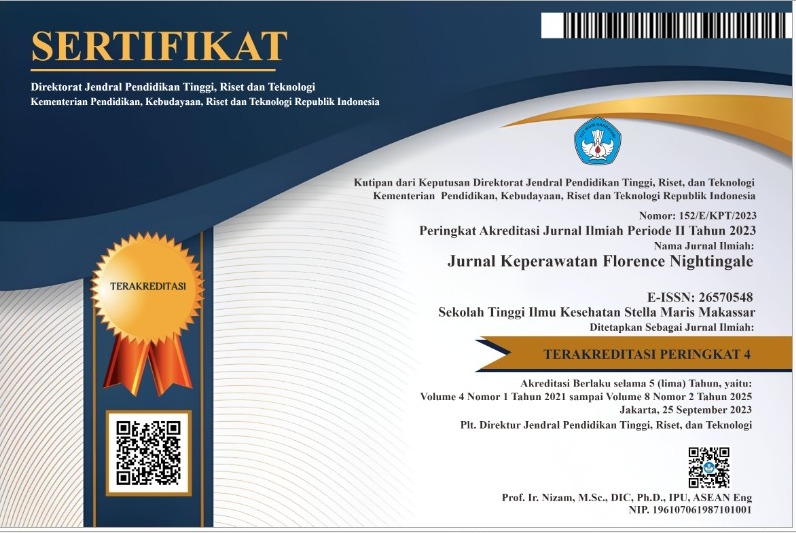Efektivitas Penerapan Biblioterapi Dalam Kesehatan Jiwa: Scoping Review
Keywords:
Biblioterapi, Depresi, Kesehatan Jiwa, Psikosis, RecoveryAbstract
Latar belakang: Biblioterapi telah dilakukan pada layanan perpustakaan, sekolah, atau pun lembaga sosial di beberapa negara, namun sangat sedikit informasi terkait bagaimana penerapan biblioterapi pada layanan kesehatan jiwa. Tujuan review ini untuk mengetahui efektifitas dan penerapan biblioterapi pada klien gangguan jiwa. Metode: Review ini menggunakan pendekatan Scoping Review yang tidak perlu melakukan critical appraisal dengan pencarian pada 3 database PubMed, Science Direct, dan CINAHL Ebsco. Hasil: Ditemukan 6 artikel yang relevan dengan dua masalah kejiwaan yaitu psikosis (4 artikel) dan depresi (2 artikel). Biblioterapi yang dilakukan di beberapa negara (Hungaria, Swedia, China, Thailand, Italia, dan Australia) menunjukkan efektifitas untuk membantu klien psikosis dan depresi agar dapat meningkatkan kemampuan psikososial, kognitif, mengenal ekspresi emosi, dan mampu menumbuhkan harapan dalam proses recovery. Kesimpulan: Biblioterapi dapat dilakukan pada individu ataupun kelompok dengan efektivitas signifikan dan dapat diterapkan di pelayanan kesehatan jiwa
Downloads
References
Chamberlain, D. (2019). The experience of older adults who participate in a bibliotherapy/poetry group in an older adult inpatient mental health assessment and treatment ward. Journal of Poetry Therapy, 32(4), 223–239.
Chien, W. T., Thompson, D. R., Lubman, D. I., & McCann, T. V. (2016). A Randomized Controlled Trial of Clinician-Supported Problem-Solving Bibliotherapy for Family Caregivers of People With First-Episode Psychosis. Schizophrenia Bulletin, 42(6), 1457–1466. https://doi.org/10.1093/schbul/sbw054
Cuijpers, P., Noma, H., Karyotaki, E., Cipriani, A., & Furukawa, T. A. (2019). Effectiveness and acceptability of cognitive behavior therapy delivery formats in adults with depression: a network meta-analysis. JAMA Psychiatry, 76(7), 700–707.
Eisen, K., Lawlor, C., Wu, C. D., & Mason, D. (2018). Reading and recovery expectations: Implementing a recovery-oriented bibliotherapy program in an acute inpatient psychiatric setting. Psychiatric Rehabilitation Journal, 41(3), 243.
Gualano, M. R., Bert, F., Martorana, M., Voglino, G., Andriolo, V., Thomas, R., Gramaglia, C., Zeppegno, P., & Siliquini, R. (2017). The long-term effects of bibliotherapy in depression treatment: Systematic review of randomized clinical trials. Clinical Psychology Review, 58, 49–58. https://doi.org/https://doi.org/10.1016/j.cpr.2017.09.006
Hynes, A. M., & Hynes-Berry, M. (2019). Bibliotherapy the interactive process: A handbook. Routledge.
Kementerian Kesehatan RI. (2018). Riset kesehatan Dasar. http://www.depkes.go.id/article/view/18110200003/potret-sehat-indonesia-dari-riskesdas-2018.html
Kurniawan, R. A., Suryani, S., Hernawaty, T., & Al-Kofahy, L. (2021). The Structure, Process, and Outcome of Mentorship on Survivor with Schizophrenia: A Case Study. Jurnal Keperawatan Padjadjaran, 9(1), 71–83.
McCann, T. V, Lubman, D. I., Cotton, S. M., Murphy, B., Crisp, K., Catania, L., Marck, C., & Gleeson, J. F. M. (2013). A Randomized Controlled Trial of Bibliotherapy for Carers of Young People With First-Episode Psychosis. Schizophrenia Bulletin, 39(6), 1307–1317. https://doi.org/10.1093/schbul/sbs121
Rahmat, H. K., Muzaki, A., & Pernanda, S. (2021). Bibliotherapy as An Alternative to Reduce Student Anxiety During Covid-19 Pandemic: a Narrative Review. Proceeding International Conference on Science and Engineering, 4, 379–382.
Sahami, M., & Amini, M. S. (2019). The effectiveness of bibliotherapy on stress, anxiety, and depression in women referring to Shiraz municipality cultural center, Iran.
Songprakun, W., & McCann, T. V. (2012). Evaluation of a bibliotherapy manual for reducing psychological distress in people with depression: a randomized controlled trial. Journal of Advanced Nursing, 68(12), 2674–2684. https://doi.org/https://doi.org/10.1111/j.1365-2648.2012.05966.x
Subandi, M. A. (2011). Family expressed emotion in a Javanese cultural context. Culture, Medicine and Psychiatry, 35(3), 331–346. https://doi.org/10.1007/s11013-011-9220-4
Szabó, J., & Sipos, M. (2018). Training the recognition of emotions based on bibliotherapy techniques. Psychiatria Danubina, 30(6), 380–383.
Tasijawa, F. A., Suryani, S., Sutini, T., & Maelissa, S. R. (2021). Recovery from ‘schizophrenia’: Perspectives of mental health nurses in the Eastern island of Indonesia. Belitung Nursing Journal;DOI - 10.33546/Bnj.1621. https://belitungraya.org/BRP/index.php/bnj/article/view/1621
Volpe, U., Torre, F., De Santis, V., Perris, F., & Catapano, F. (2015). Reading Group Rehabilitation for Patients with Psychosis: A Randomized Controlled Study. Clinical Psychology & Psychotherapy, 22(1), 15–21. https://doi.org/https://doi.org/10.1002/cpp.1867
Yuan, S., Zhou, X., Zhang, Y., Zhang, H., Pu, J., Yang, L., Liu, L., Jiang, X., & Xie, P. (2018). Comparative efficacy and acceptability of bibliotherapy for depression and anxiety disorders in children and adolescents: a meta-analysis of randomized clinical trials. Neuropsychiatric Disease and Treatment.
Published
How to Cite
Issue
Section
Copyright (c) 2021 Fandro Tasijawa, Rozali Arsyad Kurniawan, Novi Aliyudin

This work is licensed under a Creative Commons Attribution-ShareAlike 4.0 International License.









